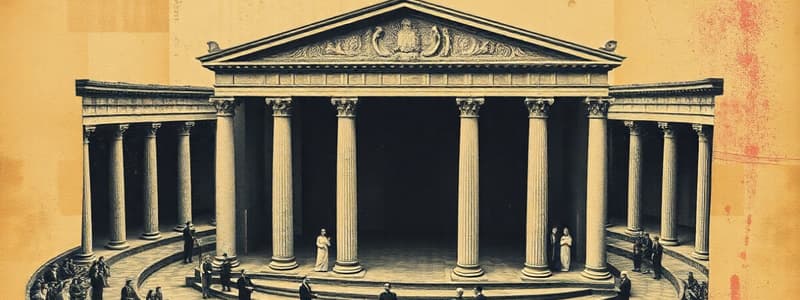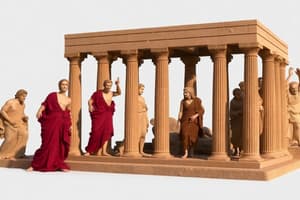Podcast
Questions and Answers
In ancient Greek theatre, what role did the messenger typically fulfill regarding acts of violence?
In ancient Greek theatre, what role did the messenger typically fulfill regarding acts of violence?
- Serving as a judge to determine the consequences of violent actions.
- Performing the violent acts onstage to create a dramatic effect.
- Providing a detailed account of the violence that occurred offstage. (correct)
- Preventing any acts of violence from occurring within the play.
How did masks primarily contribute to the performance aspect of ancient Greek theatre?
How did masks primarily contribute to the performance aspect of ancient Greek theatre?
- They symbolized the emotional state of the chorus, changing with the mood of the play.
- They enabled quick costume changes between scenes.
- They were designed to amplify the actors' voices, ensuring audibility in large open-air theatres.
- They allowed a limited number of actors to portray multiple characters, indicating age, gender, and social status. (correct)
What was the function of the chorus in ancient Greek drama?
What was the function of the chorus in ancient Greek drama?
- To perform elaborate dances that underscored the themes of the play, without engaging in dialogue.
- To provide musical interludes between scenes, offering the audience a break from the dramatic action.
- To serve as stagehands, managing props and scenery changes during the performance.
- To engage in dialogue with the characters, offer commentary on the events, and provide context. (correct)
Which of the following best describes the skene in an ancient Greek theatre?
Which of the following best describes the skene in an ancient Greek theatre?
Which of the following is a characteristic typically associated with Greek comedies, particularly those written by Aristophanes?
Which of the following is a characteristic typically associated with Greek comedies, particularly those written by Aristophanes?
What is 'catharsis' in the context of Greek tragedy?
What is 'catharsis' in the context of Greek tragedy?
What is the significance of the play Lysistrata by Aristophanes?
What is the significance of the play Lysistrata by Aristophanes?
Which playwright is best known for writing the trilogy The Oresteia, which includes Agamemnon, The Libation Bearers, and The Eumenides?
Which playwright is best known for writing the trilogy The Oresteia, which includes Agamemnon, The Libation Bearers, and The Eumenides?
How does modern Greek theatre typically differ from ancient Greek theatre practices?
How does modern Greek theatre typically differ from ancient Greek theatre practices?
Which of Sophocles' plays are known collectively as the 'Theban Plays'?
Which of Sophocles' plays are known collectively as the 'Theban Plays'?
Flashcards
Greek Theatre
Greek Theatre
A theatrical tradition that originated in ancient Greece, marked by masked actors and emphasis on mythology.
Orchestra
Orchestra
The area in front of the stage used for chorus performances in Greek theatre.
Theatron
Theatron
The seating area for the audience, usually built into a hillside.
Skene
Skene
Signup and view all the flashcards
Parodos
Parodos
Signup and view all the flashcards
Greek Chorus
Greek Chorus
Signup and view all the flashcards
Aristophanes
Aristophanes
Signup and view all the flashcards
Catharsis
Catharsis
Signup and view all the flashcards
Euripides
Euripides
Signup and view all the flashcards
Sophocles
Sophocles
Signup and view all the flashcards
Study Notes
Introduction to Greek Theatre
- Greek theatre was an integral part of theatre festivals.
- Actors wore masks.
- Violence wasn't shown on stage; messengers described it in detail.
- Plays used both verse and prose.
- The Golden Age of Greek Theatre was in the 5th century BCE.
- Mythology was a common theme.
Parts of the Theatre
- Orchestra: The stage area, typically flat, where the chorus sang and danced. An altar was often in the center.
- Theatron: The seating area for the audience, usually on a hillside.
- Skene: The stage house located behind the orchestra and opposite the theatron. It was used for entrances and exits.
- Parodos: Pathways used by actors and the chorus to enter and exit the stage.
Masks
- Ancient Greek plays used actors wearing masks.
- Masks represented age, gender, and social status.
Greek Chorus
- The chorus was a masked group in ancient Greek plays.
- They sang and danced.
- They engaged in dialogue with the characters.
- They commented on the events of the play.
Greek Playwrights
- Aristophanes, Euripides, Sophocles, and Aeschylus were important Greek playwrights.
- Aristophanes ("Father of Comedy") wrote The Frogs, The Clouds, The Birds, and Lysistrata. His plays parodied politicians and contained raunchy jokes, songs, and fantastical themes
- Aeschylus ("Father of Greek Tragedy") wrote The Oresteia trilogy (Agamemnon, The Libation Bearers, The Eumenides).
- Sophocles wrote Oedipus Rex, Oedipus at Colonus, and Antigone.
- Euripides wrote Medea, The Trojan Women, and The Bacchae.
Modern Greek Theatre
- Modern Greek theatre typically does not use masks.
- Female actors perform.
- More than three actors are often involved.
- Plays can be set in any time period.
Studying That Suits You
Use AI to generate personalized quizzes and flashcards to suit your learning preferences.





